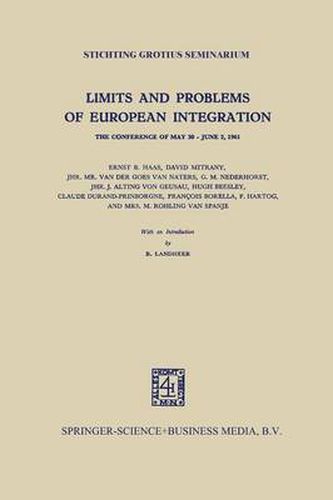Readings Newsletter
Become a Readings Member to make your shopping experience even easier.
Sign in or sign up for free!
You’re not far away from qualifying for FREE standard shipping within Australia
You’ve qualified for FREE standard shipping within Australia
The cart is loading…






This title is printed to order. This book may have been self-published. If so, we cannot guarantee the quality of the content. In the main most books will have gone through the editing process however some may not. We therefore suggest that you be aware of this before ordering this book. If in doubt check either the author or publisher’s details as we are unable to accept any returns unless they are faulty. Please contact us if you have any questions.
by B. LANDHEER The Grotius Seminarium has as its purpose the study of international problems under the aspect of living and cooperating in one world. Its Conference of May 30-June 2, I96I on Limits and Problems of European integration attempted to view European integration within the framework of this general goal as is somewhat implied in its title. The limits of European integration lie in the necessity of fitting it in the wider framework of international cooperation, while its problems lie in the various interpretations and concretizations of its own goals, ab out which there are a number of different viewpoints. It could be stated that the European is faced with three sets of problems: the creation of a more unified world as a global problem; the regional integration of Europe; and, thirdly, the continuation of more strictly national interests. It is not justified to assume that these three circles of interest are automatically complementary: they are often antagonistic, and a philosophy of integration would have to arrive at a structural presentation of those various values and of tbeir interrelatedness. While it is obviously not possible for a small Conference to give those problems their full weight, it is nevertheless hoped that the essays combined in this volume raise a number of relevant questions and contribute to the elaboration of some more concrete problems.
$9.00 standard shipping within Australia
FREE standard shipping within Australia for orders over $100.00
Express & International shipping calculated at checkout
This title is printed to order. This book may have been self-published. If so, we cannot guarantee the quality of the content. In the main most books will have gone through the editing process however some may not. We therefore suggest that you be aware of this before ordering this book. If in doubt check either the author or publisher’s details as we are unable to accept any returns unless they are faulty. Please contact us if you have any questions.
by B. LANDHEER The Grotius Seminarium has as its purpose the study of international problems under the aspect of living and cooperating in one world. Its Conference of May 30-June 2, I96I on Limits and Problems of European integration attempted to view European integration within the framework of this general goal as is somewhat implied in its title. The limits of European integration lie in the necessity of fitting it in the wider framework of international cooperation, while its problems lie in the various interpretations and concretizations of its own goals, ab out which there are a number of different viewpoints. It could be stated that the European is faced with three sets of problems: the creation of a more unified world as a global problem; the regional integration of Europe; and, thirdly, the continuation of more strictly national interests. It is not justified to assume that these three circles of interest are automatically complementary: they are often antagonistic, and a philosophy of integration would have to arrive at a structural presentation of those various values and of tbeir interrelatedness. While it is obviously not possible for a small Conference to give those problems their full weight, it is nevertheless hoped that the essays combined in this volume raise a number of relevant questions and contribute to the elaboration of some more concrete problems.